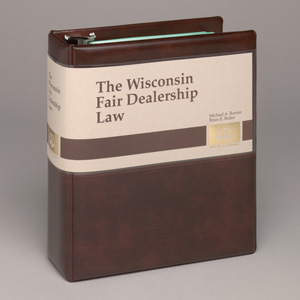
The Wisconsin Fair Dealership Law (WFDL) is a robust set of statutes intended to protect Wisconsin businesses from being exploited in their dealings with their business partners.1 The WFDL also upends most of what is expected about the relationship between law and business in the United States. The WFDL creates extra-contractual obligations on certain qualifying relationships – that is, “dealerships.” It prohibits “grantors” from ending or significantly changing relationships with “dealers,” absent good cause, proper notice, and an opportunity to cure.2 The WFDL has been employed in an “extraordinarily diverse set of business relationships”;3 these include, to name just three examples among many, prohibiting a lawn-mower manufacturer from terminating its multistate distributor,4 subjecting the city of Madison to liability for not renewing its contracts with golf pros who run the local municipal courses,5 and obligating a franchisor to provide notice exceeding its contractual requirements to institute a change explicitly anticipated in the parties’ contract.6
Despite the WFDL’s extensive protections and much litigation since the WFDL’s enactment on April 5, 1974, the metes and bounds of the law remain unfamiliar to most Wisconsin businesses. In the year of the WFDL’s 50th anniversary, we hope to continue7 to combat the information gap, by highlighting in this article one crucial development in each decade of the law’s life and why the development matters to lawyers and clients.
1970s – WFDL Is Born
The Wisconsin Fair Dealership Law was enacted in response to OPEC’s embargo on the shipment of oil to the United States.8 During the embargo, gasoline suppliers across the country overhauled their distribution networks, limiting the supply of gasoline to service stations.9 As a result, many Wisconsin gas stations were forced out of business.10
 Jeffrey A. Mandell, Univ. of Chicago 2006, is a partner at Stafford Rosenbaum LLP, Madison, where he maintains a broad practice in appellate and trial litigation, concentrating on democracy issues and dealership law. He is a current coauthor of the definitive treatise on the Wisconsin Fair Dealership Law, which is published by the State Bar of Wisconsin. He is member of the State Bar of Wisconsin’s Administrative & Local Government Law, Appellate Practice, Civil Rights & Liberties, and Litigation sections and a Fellow of the Wisconsin Law Foundation.
Jeffrey A. Mandell, Univ. of Chicago 2006, is a partner at Stafford Rosenbaum LLP, Madison, where he maintains a broad practice in appellate and trial litigation, concentrating on democracy issues and dealership law. He is a current coauthor of the definitive treatise on the Wisconsin Fair Dealership Law, which is published by the State Bar of Wisconsin. He is member of the State Bar of Wisconsin’s Administrative & Local Government Law, Appellate Practice, Civil Rights & Liberties, and Litigation sections and a Fellow of the Wisconsin Law Foundation.
 Isaac S. Brodkey, U.W. 2021, is a senior associate in Stafford Rosenbaum LLP’s Madison office; his practice focuses primarily on dealership and franchise issues. He is member of the State Bar of Wisconsin’s Business Law and Litigation sections and Young Lawyers Division.
Isaac S. Brodkey, U.W. 2021, is a senior associate in Stafford Rosenbaum LLP’s Madison office; his practice focuses primarily on dealership and franchise issues. He is member of the State Bar of Wisconsin’s Business Law and Litigation sections and Young Lawyers Division.
After public outcry, Wisconsin legislators reintroduced the WFDL, which had failed to gain traction in previous legislative sessions.11 When signed into law, the WFDL was heralded by Governor Patrick Lucey as the “Magna Carta” for Wisconsin businesses, extending protection to a variety of enterprises lining “main street” Wisconsin.12 The law was later amended to include specific policy declarations, including to “promote the compelling interest of the public in fair business relations between dealers and grantors, and in the continuation of dealerships on a fair basis” and to “protect dealers against unfair treatment by grantors, who inherently have superior economic power and superior bargaining power in the negotiation of dealerships.”13
The law is short, comprising merely 11 short statutes, totaling just over 1,320 words – about half the length of this article. At its core, the WFDL provides that a “grantor” cannot terminate, cancel, fail to renew, or substantially change the competitive conditions of a “dealership” without good cause, proper notice, and an opportunity to cure the dealer’s deficiencies.14 A dealership exists 1) where there is an agreement in which 2) a dealer is allowed to distribute or sell the goods or services or use the trade symbols of another and 3) a “community of interest” exists.15 If a grantor violates the WFDL, the dealer may sue for damages, injunctive relief, or both,16 and, if successful in proving a violation, the dealer may recoup its costs and attorney fees.17
1970s Sidelight. The WFDL was among the first dealership and franchise laws enacted in the country and remains the most protective law in its class. To the authors’ knowledge, the WFDL is the only dealership or franchise law with its own treatise. For a detailed discussion of the law from enactment to the present, seeBrian E. Butler & Jeffrey A. Mandell, The Wisconsin Fair Dealership Law (State Bar of Wis. 5th ed. 2022).
1980s – Ziegler Co. v. Rexnord Inc. – Essential Definitions
As explained above, a dealership exists when parties share a “community of interest.” The law defines a community of interest as “continuing financial interest between the grantor and grantee in either the operation of the dealership business or the marketing of such goods or services,” but that definition does not offer much clear guidance in separating protected dealerships from ordinary vendor-vendee relationships.18 Indeed, whether a community of interest exists is often the most important question in any given dealership case.
In Ziegler Co. v. Rexnord Inc.,19 the Wisconsin Supreme Court established a comprehensive framework for courts and litigants to use in determining whether a community of interest exists. To start, the court established two guideposts: 1) a continuing financial interest and 2) interdependence. A continuing financial interest is defined as “shared financial interest in the operation of the dealership or marketing of a good or service,” while interdependence means “[the] degree to which the dealer and grantor cooperate, coordinate their activities and share common goals.”20 For a protected dealership to exist, these guideposts must reveal that the purported dealer would suffer significant economic harm if the grantor were to end or substantially change the parties’ dealership.21
The Ziegler court also set forth 10 facets for courts to consider when assessing whether a community of interest exists:
How long the parties have dealt with each other;
The extent and nature of the obligations imposed on the parties in the contract or agreement between them;
What percentage of time or revenue the alleged dealer devotes to the alleged grantor’s products or services;
What percentage of the gross proceeds or profits of the alleged dealer derives from the alleged grantor’s products or services;
The extent and nature of the alleged grantor’s grant of territory to the alleged dealer;
The extent and nature of the alleged dealer’s uses of the alleged grantor’s proprietary marks (such as trademarks or logos);
The extent and nature of the alleged dealer’s financial investment in inventory, facilities, and goodwill of the alleged dealership;
The personnel that the alleged dealer devotes to the alleged dealership;
How much the alleged dealer spends on advertising or promotional expenditures for the alleged grantor’s products or services; and
The extent and nature of any supplementary services provided by the alleged dealer to consumers of the alleged grantor’s products or services.22
Although courts are not obligated to consider any of these facets and a court may consider facts that fall outside these enumerated facets, the Ziegler decision established a directional blueprint for courts to consider the totality of the parties’ dealings when assessing whether a community of interest exists. For nearly 40 years, this decision has been ubiquitously cited by courts and litigants alike when addressing the community-of-interest question, and some recital of the Ziegler facets appears in almost every decision applying the statute. Calling Ziegler Co. v. Rexnord Inc. a “seminal decision” is an understatement.
1980s Sidelight. Attorneys should be aware of the divergent approaches taken by state and federal courts when analyzing whether a community of interest exists. The Seventh Circuit has “distilled” the analysis to whether a dealer can demonstrate that it derives a high percentage of its revenue from its relationship with the grantor, has undertaken specialized investments to sell the grantor’s products, or both.23 This test has been more exacting for dealers.
1990s – Morley-Murphy v. Zenith –Good Cause and Damages
The Seventh Circuit’s decision in Morley-Murphy v. Zenith24 was the most important development in the WFDL during the 1990s. Morley-Murphy sold Zenith televisions and other consumer electronics in Wisconsin, Michigan’s Upper Peninsula, Iowa, Minnesota, North Dakota, and South Dakota.25 Beginning in the mid-1980s, Zenith began to incur significant losses, exceeding $320 million in the five years before litigation.26 To stanch these losses, Zenith sought to disband its distribution network and sell directly to consumers.27 Morley-Murphy sued under the WFDL, seeking damages because of the allegedly unlawful termination.
The U.S. District Court for the Western District of Wisconsin found at summary judgment that a dealership existed and that Zenith had violated the WFDL by terminating the relationship.28 The issue of damages was then tried to a jury, yielding an award to Morley-Murphy of over $2 million.
On appeal, the Seventh Circuit made two significant findings.
First, the Seventh Circuit found that there was a triable issue of fact as to whether good cause existed based on Zenith’s economic circumstances.29 Restating Wisconsin precedent, the court held that, even though the WFDL addresses good cause exclusively in terms of a dealer’s shortcomings, it also is possible to define “good cause” by reference to the grantor’s circumstances. The court held that for Zenith to establish its own financial straits constituted good cause under the WFDL, on remand Zenith would have to demonstrate the following: 1) an objectively ascertainable need for its proposed change existed, 2) the grantor acted proportionately in response to that need, and 3) the grantor acted in a nondiscriminatory way.30
Despite the fact that Zenith had experienced losses well into the hundreds of millions of dollars, whether it was justified in overhauling its distribution network could not be decided as a matter of law; accordingly, the Seventh Circuit reversed the district court’s grant of summary judgment on liability.31 It is hard to think of a better illustration of the WFDL’s power than the fact that a grantor might be prohibited from ending a relationship, even amid massive, snowballing losses.
Second, the Seventh Circuit suggested that the WFDL does not allow for parties to be awarded damages based on anticipated sales beyond Wisconsin’s borders.32 The court noted that extraterritorial damages raised “significant questions” under the Commerce Clause, which had long been understood to limit a state’s ability to discriminate against or burden interstate commerce.33 Thus, on remand, the jury was implored to limit damages to anticipated sales within Wisconsin, if it found liability and damages to be appropriate.34 While this discussion was clearly dicta, federal courts have followed this direction and have, by and large, refused for the last 25 years to award damages based on sales outside Wisconsin.35
1990s Sidelight. In 2023, the U.S. Supreme Court decided National Pork Producers Council v. Ross, which should trigger reconsideration of Morley-Murphy’s extraterritoriality analysis. The Ross decision clarifies that, absent a showing of purposeful discrimination against non-Wisconsin businesses, the Commerce Clause does not prohibit applying the WFDL extraterritorially.36
2000s – Baldewein Co. v. Tri-Clover Inc. – Meaning of “Situated in this State”
The WFDL as first enacted did not differentiate between in-state and out-of-state dealerships. In 1977, after the Fifth and Sixth Circuits each applied the WFDL to relationships having little connection to Wisconsin, the Wisconsin Legislature amended the law to apply only to dealerships “situated in this state.” The 1977 amendment set the rule but offered little guidance on what it means for a dealership to be “situated in” Wisconsin. In 2000, the Wisconsin Supreme Court shed light in its Baldewein Co. v. Tri-Clover Inc.37 decision.
Baldewein, an Illinois-based dealer, derived approximately 90% of its total revenue from the sale of products from Tri-Clover, a Delaware-based grantor.38 When Tri-Clover sought to terminate their relationship, Baldewein filed suit in the Eastern District of Wisconsin, alleging that the termination violated the WFDL.39
The district court granted summary judgment in Tri-Clover’s favor on the ground that not enough of the dealership’s sales were in Wisconsin to qualify for WFDL protection. (Only 4-7% of Baldewein’s sales arose in Wisconsin.40) A contrary finding, per the district court, would allow any dealership to claim WFDL protection by “the simple trick of a Wisconsin choice-of-law provision and a single sale to the State.”41 Baldewein appealed, and the Seventh Circuit certified to the Wisconsin Supreme Court two questions relating to when a facially out-of-state dealer could claim protection under the WFDL.42
The supreme court accepted both questions but reframed them as one: “when is a dealership ‘situated in this state’ under Wis. Stat. Section 135.02(2), thereby entitling the dealer to protection under the Wisconsin Fair Dealership Law?”43 In answering this question, the supreme court expounded nine facets that a court can consider when determining whether a dealership is situated in Wisconsin.44 Those facets, borrowed heavily from Ziegler, focus on the extent of the dealership’s connections to Wisconsin.45 Crucially, the court declined to decide as a matter of law whether Baldewein’s dealership was situated in Wisconsin for WFDL purposes.46
2000s Sidelight. The Baldewein decision is particularly important for multistate distributors seeking protection under the WFDL. As it plays out, the test has been less exacting than whether a community of interest exists between the parties, as courts have recognized that percentages as low as 4% and 5% of total sales can be sufficient to situate a dealership in Wisconsin and warrant protection under the WFDL.47
2010s – Benson v. City of Madison – Expanding the Universe of Grantors
In Benson v. City of Madison,48 the Wisconsin Supreme Court raised some eyebrows when it held that a protected dealership existed between the city of Madison and golf pros the city had hired to manage and administer Madison’s municipal golf courses. The Benson decision is often referred to in connection with the supreme court’s holding that a municipality can be subject to the WFDL, but the decision’s community-of-interest analysis is equally noteworthy.
The supreme court focused little on the unique nature of the claim and heavily on the statute’s text.49 The WFDL provides that a grantor can be any “person,” which it defines as “a natural person, partnership, joint venture, corporation or other entity.”50 The court found that Wisconsin law has long recognized municipalities as corporations and thus the parties’ relationships could be protected by the WFDL so long as the purported dealers could demonstrate that they were granted the right to sell or distribute city goods and services and that a community of interest existed.51
Regarding the community-of-interest analysis, the supreme court endorsed a more relaxed approach. The supreme court held that the Ziegler facets “may” be used in determining whether a community of interest existed but declined to analyze the golf pros’ claim under those facets.52 Indeed, the supreme court only passingly considered one Ziegler facet – the purported dealer’s financial investment – in determining that a community of interest existed.53
The Benson court found the dealers’ “sunk” investments in training employees, purchasing suppliers, and contributing $1,000-3,500 per year to a marketing plan were among the crucial facts demonstrating that a community of interest existed.54 There is no mention in the opinion of the percentage of revenue or profits derived from the relationship, nor is there any discussion on the recoverability of the dealer’s investment.
2010s Sidelight. While the Benson decision is, to the authors’ knowledge, the only published decision in which a party’s relationship with a municipality has been protected by a dealership or franchise law, the door is open for other governmental service providers to make claims under the WFDL. Indeed, the Benson court noted that the term “entity” is broad and may include other governmental units.55
Conclusion
George Orwell famously quipped that “at 50, everyone has the face he deserves.” That quote seems to suit the Wisconsin Fair Dealership Law well: 50 years show the law has withstood the test of time, striking an important and delicate balance between protecting dealer interests but not handcuffing grantors to unsuccessful dealers. While it might be a fool’s errand to think of what life will look like in 2074, so long as the WFDL is around, Wisconsin businesses reliant on their relationships with other parties will continue to be afforded significant protections.
Also of Interest | Untangle the Wisconsin Fair Dealership Law

The Wisconsin Fair Dealership Law, now in its fifth edition, helps unravel a complicated and sometimes misapplied set of statutes, which were originally designed to protect gasoline dealers but now extend into many other supplier and reseller relationships.
The book will help lawyers avoid being snared by the fair dealership law. Readers will gain an understanding of the law’s implications through the authors’ parsing of the language of the statute and discussion of relevant case law.
Authors Brian E. Butler and Jeffrey A. Mandell discuss myriad cases and opinions, published and unpublished, in which state and federal courts have construed and explained the WFDL. The book combines practical advice and in-depth analysis; the authors have condensed that case law into concise, readable, and succinct descriptions of the statutory requirements and prohibitions, making research quicker and easier.
Find out how to help business clients with WFDL matters by ordering your copy of The Wisconsin Fair Dealership Law.
Endnotes
1 Wis. Stat. ch. 135. Wis. Stat. chapter 135, Dealership Practices, contains 11 statutes.
2 Wis. Stat. §§ 135.03-.04.
3 Ziegler Co. v. Rexnord Inc., 139 Wis. 2d 593, 602, 407 N.W.2d 873 (1987).
4 Keen Edge Co. v. Wright Mfg. Inc., No. 19-CV-1673-JPS, 2020 WL 4926664 (E.D. Wis. Aug. 21, 2020) (unpublished).
5 Benson v. City of Madison, 2017 WI 65, 376 Wis. 2d 35, 897 N.W.2d 16.
6 Jungbluth v. Hometown Inc., 201 Wis. 2d 320, 548 N.W.2d 519 (1996).
7 Over the past 50 years, the Wisconsin Lawyer has been at the forefront of combatting this information gap and has published several articles addressing various aspects of the WFDL. See, e.g., Joseph P. Wright & Thomas B. Aquino, Understanding the Wisconsin Fair Dealership Law, Wis. Law. (Nov. 2009); Joseph P. Wright, Determining “Community of Interest” Under the WFDL, Wis. Law. (Dec. 2004); Charles S. Modell & Joseph J. Fittante Jr., Avoiding the Accidental Franchise, Wis. Law. (May 2003); Harold A. Laufer, Changing Business Strategy Under the Wisconsin Fair Dealership Law, Wis. Law. (March 1991).
8 Interview with William Nelson (on file with authors); see also Brian E. Butler & Jeffrey A. Mandell, The Wisconsin Fair Dealership Law § 1.3(State Bar of Wis. 5th ed. 2022).
9 The Wisconsin Fair Dealership Law, supra note 8, § 1.3.
10 Id.
11 Interview with William Nelson (on file with authors); see alsoThe Wisconsin Fair Dealership Law, supra note 8, § 1.3.
12 Bush v. National Sch. Studios Inc., 139 Wis. 2d 635, 407 N.W.2d 883 (1987).
13 Wis. Stat. § 135.025(2)(a)-(b).
14 Wis. Stat. §§ 135.03-.04.
15 Wis. Stat. § 135.02(3)(a).
16 Wis. Stat. § 135.06.
17 Id.
18 Wis. Stat. § 135.02(1).
19 ZieglerCo. v. Rexnord Inc., 139 Wis. 2d 593, 407 N.W.2d 873 (1987).
20 Id. at 604-05.
21 Id. at 605.
22 Id. at 605-06.
23 Frieburg Farm Equip. Inc. v. Van Dale Inc., 978 F.2d 395, 399 (7th Cir. 1992).
24 Morley-Murphy Co. v. Zenith Elec. Corp., 142 F.3d 373 (7th Cir. 1998).
25 Id. at 374.
26 Id. at 374-75.
27 Id. at 375.
28 Id. at 374.
29 Id. at 378.
30 Id. at 377-78.
31 Id.
32 Id. at 380.
33 Id. at 379.
34 Id. at 382.
35 See, e.g., Generac Corp. v. Caterpillar Inc., 172 F.3d 971, 976 (7th Cir. 1999); Baldewein Co. v. Tri-Clover Inc., 2000 WI 20, ¶ 24 n.6, 233 Wis. 2d 57, 606 N.W.2d 145; Brio Corp. v. Meccano S.N., 690 F. Supp. 2d 731, 745 n.5 (E.D. Wis. 2010); Brava Salon Specialists LLC v. Swedish Haircare Inc., No. 22-cv-695-wmc, 2023 WL 1795512, at *3 (W.D. Wis. Feb. 7, 2023); Track Inc. v. ASH N. Am. Inc., No. 21-CV-786-JDP, 2023 WL 2733679, at *5 (W.D. Wis. Mar. 31, 2023).
36 National Pork Producers Council v. Ross, 598 U.S. 356 (2023); see Jeffrey A. Mandell & Isaac S. Brodkey, On Fair Dealership Law Damages for Sales Beyond Wisconsin’s Borders, State Bar of Wis., InsideTrack (Sept. 6, 2023).
37 BaldeweinCo., 2000 WI 20, 606 N.W.2d 145.
38 Id. ¶¶ 2-5.
39 Id. ¶ 7.
40 Id. ¶¶ 8-9.
41 Id.
42 Id. ¶ 10
43 Id. ¶ 1 n.2.
44 Id. ¶ 1
45 Id. ¶ 30.
46 Id. ¶ 34.
47 See Brio Corp., 690 F. Supp. 2d 731. For more on the Baldewein decision, see Eric J. Meier, When is a Business a “Wisconsin Business”? Baldewein v. Tri-Clover: A New Multifactor Approach to the “Situated in This State” Requirement of The Wisconsin Fair Dealership Law, 2001 Wis. L. Rev. 1403.
48 Benson v. City of Madison, 2017 WI 65, 376 Wis. 2d 35, 897 N.W.2d 16.
49 Id. ¶¶ 21-33.
50 Id. ¶ 24 (citing Wis. Stat. § 135.02(6)).
51 Id. ¶¶ 33-34.
52 Id. ¶ 49 n.15.
53 Id. ¶ 51.
54 Id.
55 See, e.g., Order, JusticePoint Inc. v. City of Milwaukee, No. 2023AP1970 (Wis. Ct. App. Nov. 6, 2023); Erin Deeley & Jeffrey Mandell, The Wisconsin Fair Dealership Law Enters Its 50th Year: Novel Applications (Feb. 8, 2024), https://www.staffordlaw.com/blog/dealership-and-franchise-law/wisconsin-fair-dealership-law-novel-applications/.
» Cite this article: 97 Wis. Law. 10-15 (March 2024).
